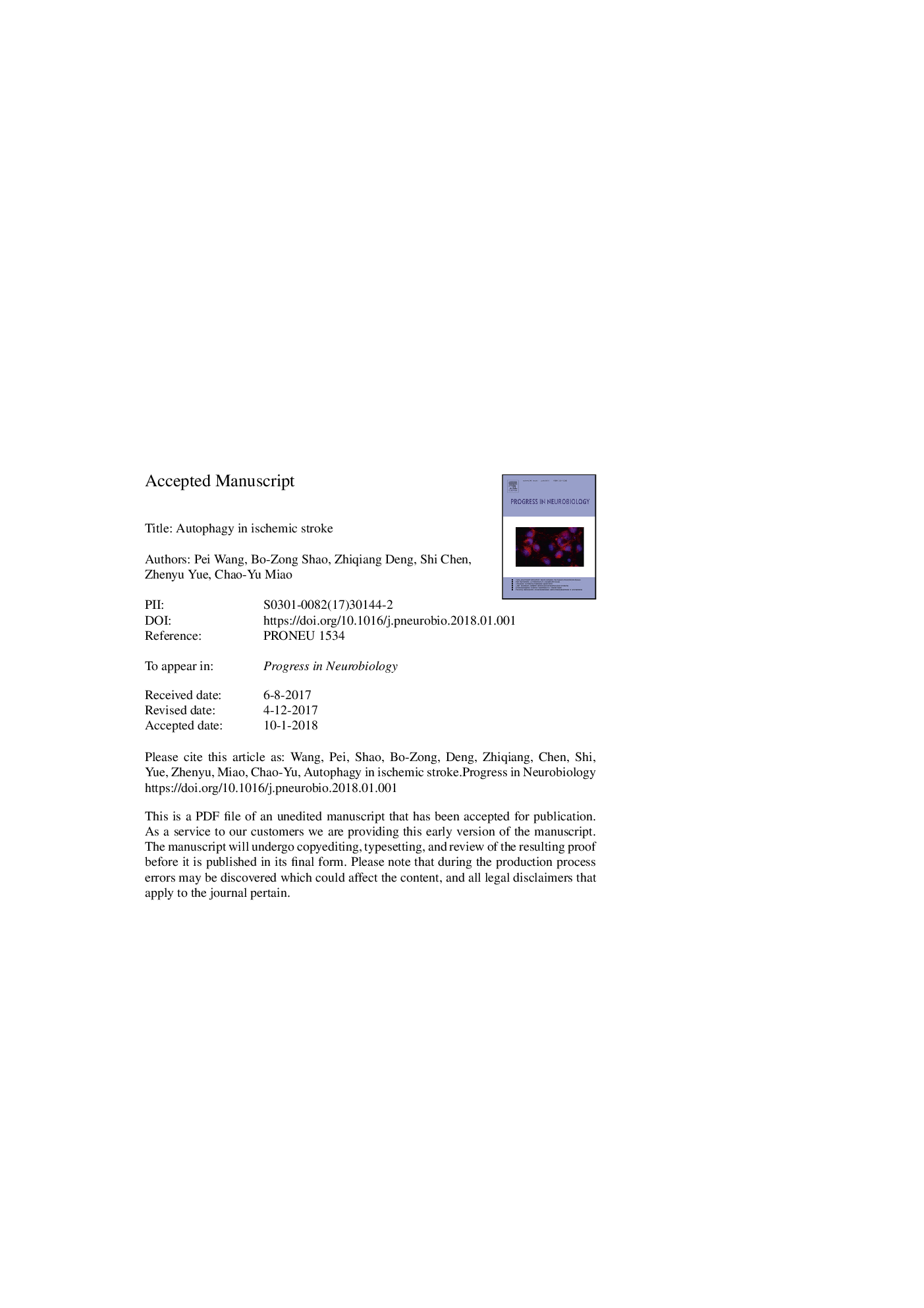| Article ID | Journal | Published Year | Pages | File Type |
|---|---|---|---|---|
| 8842182 | Progress in Neurobiology | 2018 | 78 Pages |
Abstract
Autophagy is a self-eating cellular catabolic pathway, through which long-lived proteins, damaged organelles and misfolded proteins are degraded and recycled for the maintenance of cellular homeostasis and normal cellular functions. Autophagy plays an important homeostatic role in the regulation of cell survival. Accumulating evidence shows that autophagy is activated in various cell types in the brain such as neurons, glia cells, and brain microvascular cells upon ischemic stroke. However, the exact role and molecular mechanisms of autophagy process that is implicated in ischemic stroke have yet to be elucidated. This review aims to provide a comprehensive view of the regulation of autophagy in neurons, glia cells, and brain microvascular cells in response to ischemia stress. We also review the recent advance on the understanding of the involvement of autophagy in the pathological process during cerebral ischemic preconditioning, perconditioning and postconditioning. We propose a crosstalk between autophagy, necroptosis, and apoptosis that contribute to ischemic stroke. In addition, we discuss the interactions between autophagy and oxidative stress, mitochondrial dysfunction and endoplasmic reticulum stress.
Keywords
AMPKCREBPPAR-γNF-κBPI3KIL-6PARP-1DALYsGFPNrf2AβmTORNEMOhsp70TNFR1OGDNMDAN-methyl-d-aspartateMCAOPINK1HIF1MnSODUPRATGeIF2αATF6IKKIP3R3-MADISCFADDBCCAoNAMPTNMNBFAGRP78FOXO3CK2PKRmTORC1FXRZO-1NLRP3DAPKRNA-activated protein kinaseTIGARCaMKKTP53-induced glycolysis and apoptosis regulatorJnk1TRADDLAMP2TFEBRIP1DRAMFIP200XBP1STSC2MLKLFUNDC1PI3KC3BNIP3LUNC-51-like kinasePGAM5damage-regulated autophagy modulatorNLR family pyrin domain containing 3TNF-α receptor 13-methyladenineAMP-activated protein kinaseULKfarnesoid X receptorIκB kinaseIRE1αMAPKMitogen activated protein kinasesmTOR complex 1NOxPTEN-induced putative kinase 1Small interfering RNAROSsiRNAadenosine 5′-triphosphateATPamyloid βinositol-requiring enzyme 1αAktAIFAutophagymiddle cerebral artery occlusionbilateral carotid artery occlusionNADPH oxidaseinterleukin-6bafilomycin A1Oxidative stresstumor necrosis factor-αFas-associated death domainApoptosisWorld Health OrganizationDisability-Adjusted Life YearsSODBBBbrain microvascular endothelial cellsmanganese superoxide dismutaseSuperoxide dismutaseIschemic strokeendoplasmic reticulumNF-E2-related factor 2eukaryotic initiation factor 2αapoptosis-inducing factorhypoxia-inducible factor 1Transcription factor EBphosphoglycerate mutase family member 5Fas LigandFasLTNF-αnuclear factor-κBPhosphatidylinositol 3-kinaseactivating transcription factor 6TRAILTNF-related apoptosis-inducing ligandBlood-brain barrierOxygen-glucose deprivationNF-κB essential modulatorNecroptosisNADZonula occludens-1Necrosisnicotinamide adenine dinucleotidenicotinamide phosphoribosyltransferasenicotinamide mononucleotidemammalian target of rapamycinBcl-2 homologyUnfolded protein responsecAMP-response element binding proteinglucose-regulated protein 78heat shock protein 70lysosome-associated membrane protein 2green fluorescent proteinmixed lineage kinase domain-like proteinprotein kinase Bdeath-associated protein kinasePERKPoly(ADP-ribose) polymerase-1tuberous sclerosis complex 2death-inducing signaling complexautophagy-related genesCasein kinase 2class III phosphatidylinositol 3-kinaseWHOReactive oxygen speciesInositol trisphosphate receptorPeroxisome proliferator-activated receptor-γ
Related Topics
Life Sciences
Neuroscience
Neuroscience (General)
Authors
Pei Wang, Bo-Zong Shao, Zhiqiang Deng, Shi Chen, Zhenyu Yue, Chao-Yu Miao,
